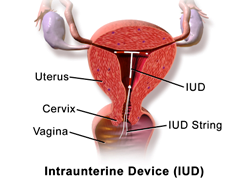An IUD provides continuous contraception as long as it's in place. You don't have to reinsert it when you want to have sex or remove it afterwards; it stays in your uterus for as long as you want to avoid pregnancy. Because inconsistent contraceptive use leads to many pregnancies, particularly in teens, this is a major benefit.
If an IUD sounds like a good contraceptive choice for you, here are a few things to keep in mind:
IUDs do not protect against sexually transmitted infections. Unless you're absolutely sure your partner has no STDs and is completely faithful, use condoms to prevent sexually transmitted infections.
Mild to severe discomfort is common with IUD insertion. Cramping may last a few days. With an IUD, your periods may be heavier than usual.
IUDs can get displaced or expelled from the uterus, and you may not know it's happened. Explusion occurs most often during your first period after the device is inserted. Soon after you've had that period, see your provider to make sure the IUD is still in place. Your provider will show you how to check your IUD so you can recheck it yourself after every period.
If you're ever unsure, make an appointment with your provider, and use another form of contraception until you know your IUD is where it's supposed to be.The risk of IUD expulsion is higher in younger women and women who have expelled IUDs in the past.
IUDs do not cause pelvic infections or infertility - STDs do. If you are interested in using an IUD, you'll be tested for chlamydia and gonorrhea before the device is inserted.
Women should not consider an IUD if they are:
* Currently pregnant
* Currently infected Bleeding for unknown reasons
They should also avoid IUD use if they have:
* Cancer of the uterus
* Birth defects of the uterus
* Allergies to any component of the IUD
The IUD is a highly effective contraceptive, but American women have shied away from it because the Dalkon Shield, one of the first IUDs introduced in the United States, was linked to high rates of infection and subsequent complications.
Today, several professional women's health groups wholeheartedly endorse the IUD for sexually active women of any age. The IUDs in use now are more sophisticated and better adapted to the reproductive tract than were the Dalkon Shield and its counterparts.
Many of the 750,000 teen pregnancies each year in the United States are due to inconsistent contraceptive use. Wider acceptance of the IUD - with its almost-unmatched simplicity - would greatly reduce that number.


















No comments:
Post a Comment